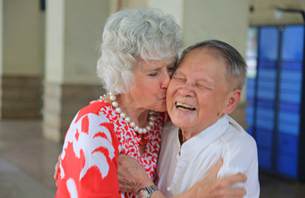French museum reveals horror of Nanjing Massacre
Daniel Renouf was born in August 1937, days after Japanese troops sparked full-scale war with China with an attack at the Marco Polo Bridge outside Beijing. This was only a few months before the Nanjing Massacre, when more than 300,000 people were slaughtered by Japanese troops.
The retired engineer-whose infancy coincided with many historic events-and his wife joined hundreds of visitors on Saturday at an exhibition about one of the single most brutal crimes associated with Japan's invasion of China.
At the time of the massacre, Nanjing was the capital of the Republic of China.
The pair, with Renouf's wife holding a cane, carefully examined many of the 270 historical photos, diaries, letters and other documents from Western diplomats, professors, doctors and reporters from the 1930s. The exhibition at the Memorial de Caen museum in France runs until Dec 15.
Renouf said the exhibition has helped refresh his childhood memories of war.
"The year 1937 is very special for us, and we had such very sad historical memories in our minds as we grew," said Renouf, who was one of the last to leave the exhibition, which opened on Saturday afternoon.
"We knew something about the Nanjing Massacre."
Renouf, a resident of Caen, a city about 200 kilometers from Paris, said the exhibition taught him more about the "horrifying pages" of Japanese aggression against China.
"These equal the Nazi crimes in Europe," said Renouf.
Japanese troops killed more than 300,000 civilians and unarmed soldiers within six weeks as they rampaged through Nanjing in 1937. Thousands of women were raped.
The Memorial de Caen museum, which opened in 1988, is dedicated to the history of conflict in the 20th century. It is considered the only European museum to recount and explain World War II from a global perspective.
"You can see that this war started in China, due to Japanese aggression. It was not only in Europe but also in Asia, mainly in China," said Stephane Grimaldi, the museum director. "We want to clarify these historic truths for the public."
Grimaldi said it is "a pity" that China's sacrifice and suffering has not been given sufficient weight in French history books.
"We must cooperate with China to help our next generations remember that it is easy for human beings to make severe mistakes," said Grimaldi, who was invited to attend the National Memorial Day events this year in China.
Grimaldi's suggestion was echoed by Zhang Jianjun, curator of the Memorial Hall for the Victims of the Nanjing Massacre in Nanjing. The memorial hall and Grimaldi's museum organized the French exhibition.
"It is very important for our young generations to remember history, and we can deepen cooperation in organizing exhibitions, history education and joint research," said Zhang, who signed an agreement on cooperation with Grimaldi prior to the exhibition's opening.
Zhai Jun, Chinese ambassador to France, who inaugurated the exhibition, said, "We aim to stop relaying hatred by remembering history."
Also Saturday, a museum dedicated to women used as sex slaves during the war opened in Shanghai. The museum, located at Shanghai Normal University, has displays of items such as condoms belonging to Japanese soldiers during WWII, which researchers obtained when surveying "comfort women" sites created by the Japanese military.






























